- Fractional CMOs provide executive-level strategy and oversight on a flexible, part-time basis without full-time salary costs.
- Full-time CMOs offer stability, cultural integration, and long-term brand vision but require high compensation and slower adaptability.
- Fractional CMOs deliver rapid impact, cross-industry expertise, and scalable engagement, making them ideal for startups, SMBs, and growth-stage firms.
Marketing leadership has transformed dramatically in the past decade. The complexity of multi-channel ecosystems, data-driven decision-making, and rapid technology adoption has reshaped what organizations expect from their Chief Marketing Officers (CMOs). Traditional leadership models often struggle to keep pace with these dynamics, particularly in businesses where flexibility and speed are paramount.
This article explores the growing shift toward hiring Fractional CMOs as an alternative to full-time executives. For clarity, a fractional CMO is an experienced marketing leader who works with a company on a part-time or contract basis to deliver strategic direction and oversee marketing operations. While full-time CMOs have historically been the norm, companies are increasingly considering fractional arrangements to balance cost, expertise, and agility.
The primary focus here is to analyze Fractional CMO vs Full-Time CMO in depth, outlining their comparative advantages, operational differences, and the strategic rationale behind choosing one over the other. This discussion goes beyond basic definitions to explore frameworks, engagement models, and implications for businesses aiming for high-impact marketing without the weight of executive overhead.
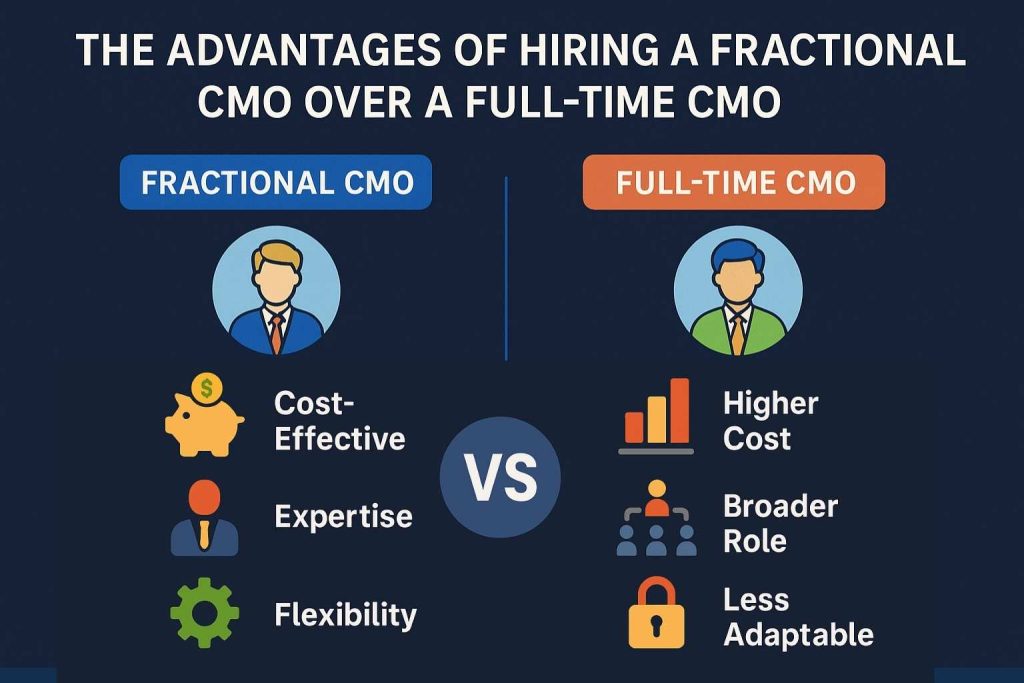
The Traditional CMO Model: Strengths and Limitations
The traditional full-time CMO role has long been regarded as a cornerstone of marketing leadership. These executives oversee a broad range of functions, including brand strategy, demand generation, team development, and marketing analytics. Their position on the leadership team ensures alignment between marketing and organizational goals, making them a critical player in driving revenue and growth.
Strengths of a Full-Time CMO
Full-time CMOs bring several advantages:
- Institutional Knowledge: They develop a deep understanding of the company’s culture, internal processes, and long-term objectives.
- Cross-Functional Influence: Their executive presence allows them to influence decisions across departments, ensuring cohesive strategies.
- Stable Leadership: Full-time roles provide continuity and predictability, which can foster trust among internal teams and stakeholders.
For large enterprises with expansive marketing operations, this model remains relevant. Organizations that require consistent leadership, particularly those managing complex branding portfolios, often find value in the full-time model.
Limitations of the Traditional Model
Despite these strengths, the traditional approach presents notable drawbacks:
- Cost Structure: A CMO’s compensation package requires a considerable annual investment, excluding bonuses and equity. For many organizations, this represents a major financial commitment.
- Hiring Risk: Misalignment in a full-time CMO hire can be costly, both financially and strategically. Terminating and replacing a CMO involves long cycles and transition disruptions.
- Adaptability Challenges: Traditional CMOs may become entrenched in existing processes, limiting their ability to pivot strategies rapidly in response to market dynamics.
When analyzing fractional CMO vs traditional CMO, it becomes clear that the latter offers stability but often lacks the flexibility and cost-efficiency required in high-growth or resource-constrained environments.
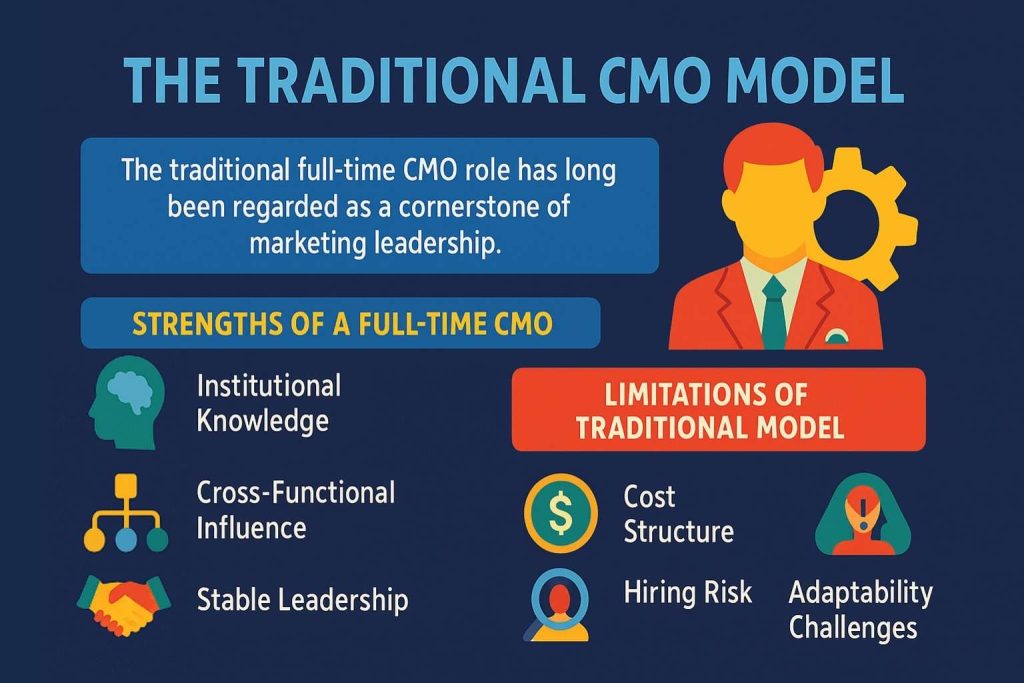
What is a Fractional Chief Marketing Officer CMO and How Does It Work?
The fractional CMO model introduces a flexible, cost-effective alternative to the traditional executive role. At its core, this arrangement allows businesses to access senior-level marketing leadership without committing to a full-time salary and benefits package.
Definition and Engagement Models
A fractional CMO operates on a part-time basis, typically working with one or multiple clients simultaneously. Engagements can vary from a few days per month to a fixed number of weekly hours, depending on the scope of work and business needs. Many fractional CMOs work under retainer agreements or project-based contracts, enabling organizations to scale their involvement over time.
For example, a Series A startup preparing for a rapid growth phase may engage a fractional CMO to develop a go-to-market strategy and oversee demand generation efforts, while a mid-sized enterprise might bring in fractional leadership to optimize marketing automation systems and improve lead conversion metrics.
How Does a Fractional CMO Work in Practice?
The operational model of a fractional CMO differs significantly from that of a traditional executive:
- Strategic Assessment: They begin by conducting an in-depth audit of current marketing initiatives, analyzing performance data, and identifying capability gaps.
- Roadmap Development: Based on business objectives, they create strategic plans aligned with revenue goals and customer acquisition targets.
- Execution Oversight: While not always executing campaigns directly, fractional CMOs ensure that in-house teams or agencies follow best practices and deliver measurable results.
- Reporting and Optimization: They implement performance dashboards, track KPIs, and adjust strategies to maximize ROI.
This approach provides organizations with access to seasoned expertise without the burden of long-term financial commitments. Companies seeking fractional CMO services benefits often prioritize agility and accountability, which are central to this engagement model.
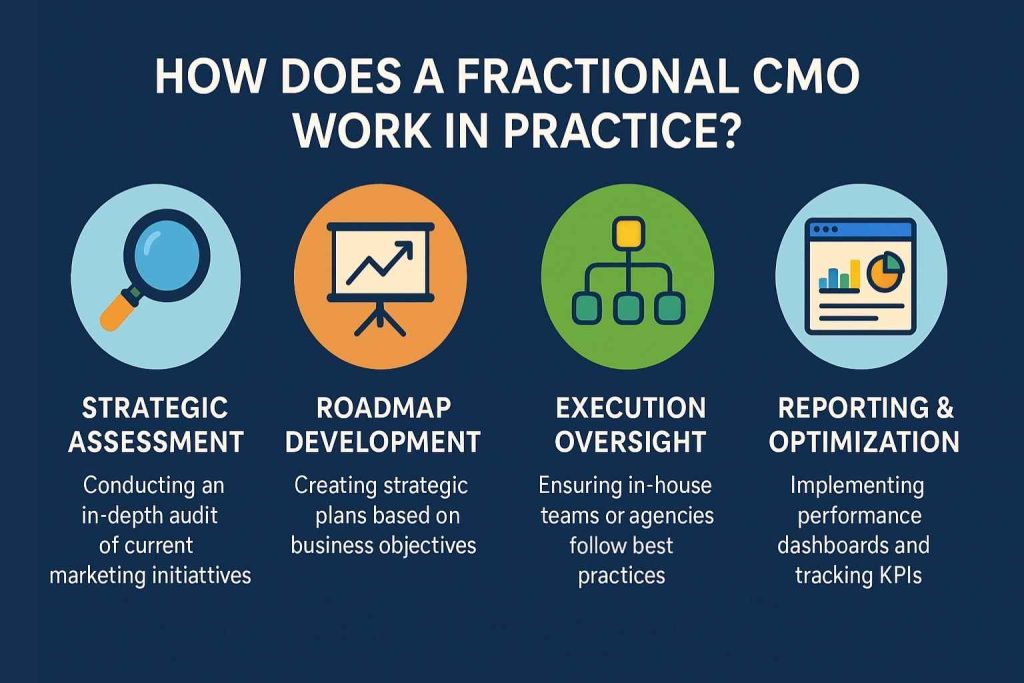
Fractional CMO Scope of Work
The responsibilities of a fractional CMO often overlap with those of a full-time counterpart but are typically more focused and outcome-driven:
- Developing brand positioning and value propositions.
- Designing integrated marketing campaigns across digital and offline channels.
- Implementing marketing technology stacks and CRM integrations.
- Establishing metrics for customer acquisition, retention, and lifetime value.
- Building or restructuring internal marketing teams to align with strategic goals.
When we talk about fractional CMO roles, we refer to a combination of strategist, mentor, and execution overseer. Unlike consultants who may provide recommendations without involvement in implementation, fractional CMOs stay engaged throughout the process to ensure alignment and accountability.
Responsibilities Comparison: Fractional CMO vs Full-Time CMO
While both models involve leadership, their responsibilities differ in scope, depth, and execution.
| Category | Fractional CMO | Full-Time CMO |
|---|---|---|
| Strategy | Fractional High-level planning, cross-industry expertise, quick execution | Full-Time Long-term, company-specific brand vision |
| Execution | Full recruitment, training, and mentorship | Directly manages in-house teams daily |
| Team Development | Advises on hiring, builds scalable processes | Full recruitment, training, and mentorship |
| Culture Integration | Limited immersion; project-focused | Deep integration into company culture |
| Flexibility | Highly adaptable; scalable engagement | Fixed engagement, less flexibility |
This comparison shows how a fractional CMO provides agility and an external perspective, while a full-time CMO ensures consistency and cultural alignment.
Comparative Analysis: Fractional CMO vs Full-Time CMO
The discussion around Fractional CMO vs Full-Time CMO is not just about cost but about alignment with organizational goals, operational flexibility, and the ability to navigate fast-evolving marketing ecosystems. Both models serve a purpose, but their suitability depends on the organization’s stage, complexity, and resource allocation.
Strategic Impact
A full-time CMO typically brings comprehensive leadership, influencing company-wide decisions. They build long-term strategies, manage large teams, and serve as key voices in board-level conversations. Their presence ensures continuity in vision and execution. However, their scope often becomes diluted by internal politics and the inertia of large-scale organizational processes.
On the other hand, a fractional CMO often enters with a mandate for transformation. These professionals excel in diagnosing gaps, prioritizing critical initiatives, and implementing frameworks quickly. They are especially valuable for high-growth companies seeking to optimize customer acquisition funnels, marketing automation, and cross-channel orchestration without enduring lengthy onboarding cycles. This adaptability is particularly advantageous in markets that reward speed and innovation.
Cost Efficiency
Financial considerations play a critical role in the fractional CMO vs. traditional CMO decision-making process. According to Glassdoor, the median annual salary for a U.S.-based CMO is well into six figures, excluding bonuses, stock options, and benefits. In competitive sectors, total compensation can be significantly higher.
By contrast, a fractional CMO engagement comes at a fraction of that cost while still providing access to senior-level expertise. Businesses can structure flexible retainers tailored to the scope of engagement and the executive’s experience level. For companies not ready to commit to a full-time hire but in need of strategic leadership, this model offers a highly compelling alternative.
Agility and Speed
A full-time CMO often spends the initial months on internal relationship-building, organizational alignment, and hiring initiatives before significant strategic shifts occur. In contrast, a fractional CMO begins with an impact-oriented mindset, focusing on critical bottlenecks and performance gaps. Their outsider perspective, combined with cross-industry experience, allows them to identify overlooked opportunities quickly.
Fractional CMOs typically bring specialized expertise in performance marketing, digital transformation, and revenue operations, areas where organizations frequently experience skill shortages. Their ability to adapt and implement best practices across diverse environments often makes them more effective in achieving short- and mid-term goals.
Expertise Breadth
One of the understated benefits of fractional leadership is exposure to multiple verticals. Many fractional CMOs have advised startups, mid-market firms, and enterprises across technology, SaaS, healthcare, and finance. This breadth translates into actionable insights and cross-pollination of innovative strategies. Unlike a full-time CMO tied to a single company’s culture and processes, fractional executives maintain fresh perspectives informed by broader market trends and evolving consumer behaviors.
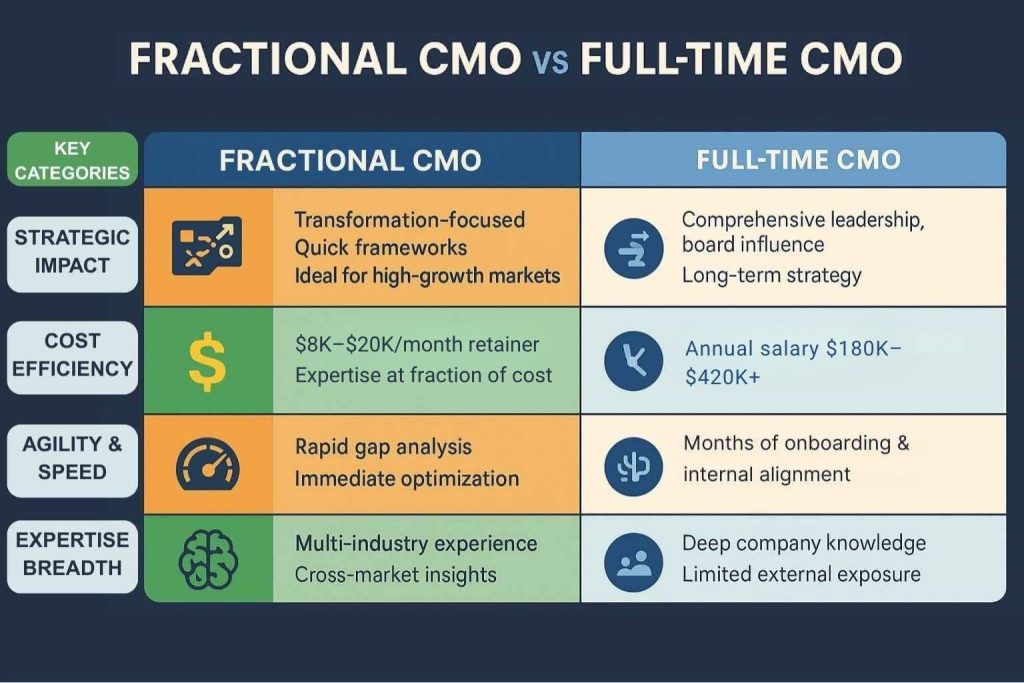
Decision Matrix: When to Choose a Fractional CMO vs Full-Time CMO
Deciding between a fractional CMO vs full-time CMO is not always straightforward. The right choice depends on your company’s size, budget, and growth stage. Use the following decision matrix as a practical guide.
| Company Stage | Marketing Budget (% of Revenue) | Team Size | Best Fit |
| Startup (<$10M revenue) | <5% | Small/none | Fractional CMO for strategic setup, demand generation, and brand positioning |
| Growth Stage ($10M–$50M) | 5–10% | Growing team | Hybrid Model: Fractional CMO with agency/vendor support to scale campaigns |
| Enterprise ($50M+) | 10%+ | Established team | Full-Time CMO for long-term brand equity, cultural integration, and global oversight |
This framework helps leaders match their strategic needs with the right engagement model, ensuring both budget efficiency and operational alignment.
Ultimately, understanding the benefits of hiring a fractional CMO helps businesses align leadership strategy with growth objectives.
Cost of Hiring a CMO
One of the most tangible differences in the fractional CMO vs full-time CMO debate comes down to cost. The financial commitment for a full-time CMO is dramatically higher than a fractional engagement, not only because of salary but also because of benefits, equity, and overhead.
| Role | Cost Structure | Annual Range | Additional Costs |
| Full-Time CMO | Salary + Bonus + Equity | $180K–$420K+ | Benefits, severance, recruiting, training |
| Fractional CMO | Retainer / Project / Hourly | $60K–$180K | Minimal (no benefits, lower onboarding costs) |
Global Snapshot:
- US: $200K–$350K salary for full-time CMOs; $8K–$20K/month for fractional CMOs.
- Europe: €150K–€250K salary for full-time; €6K–€15K/month for fractional.
- Asia: $100K–$200K salary for full-time; $4K–$12K/month for fractional.
Fractional CMOs are particularly attractive for SMBs and growth-stage firms, because they provide executive-level strategy and execution oversight without locking up capital in long-term compensation packages. This flexibility allows businesses to reinvest savings into campaign execution, product development, or scaling operations.
The Strategic Value of a Fractional CMO
The conversation about why to hire a fractional CMO centers on value creation. Beyond cost savings, the benefits of a fractional CMO include strategic advantages that can accelerate growth and optimize resource allocation.
Strategic gains from a fractional CMO are the following:
Financial Flexibility
Executive leadership is expensive, but not every organization requires a full-time CMO to achieve its marketing goals. Hiring a fractional CMO enables businesses to:
- Access senior-level expertise without committing to a six-figure salary.
- Redirect capital savings toward demand generation, martech platforms like HubSpot, or performance-based campaigns.
- Engage leadership on a scalable basis, adjusting involvement as needs evolve.
For private equity-backed companies or early-stage startups, this model aligns with capital efficiency objectives, ensuring funds support growth rather than administrative overhead.
Immediate Impact
Fractional CMOs bypass the slow ramp-up typical of full-time hires. Their engagements often begin with audits of analytics systems, pipeline health assessments, and revenue forecasting models. By leveraging data-driven frameworks such as the Balanced Scorecard or OKRs (Objectives and Key Results), they can identify priority areas and execute changes within weeks rather than quarters.
Moreover, fractional leaders often arrive with established relationships with creative agencies, technology vendors, and media partners, accelerating procurement and execution processes. This network effect becomes particularly valuable for businesses that lack mature vendor ecosystems.
Access to Senior Expertise
When you consider fractional CMO services benefits, the expertise component cannot be overstated. Most fractional CMOs are seasoned professionals who have previously held senior positions at top organizations or agencies. They bring:
- Mastery of multi-channel attribution models.
- Deep knowledge of customer lifecycle optimization.
- Proficiency in platforms such as Salesforce Marketing Cloud and advanced analytics suites.
This level of expertise would typically be out of reach for smaller firms without a fractional engagement model. It allows businesses to tap into executive-level strategy without diluting their marketing spend.
Scalability and Adaptability
Organizations experiencing rapid growth, seasonal fluctuations, or significant market pivots require adaptable leadership. Fractional CMOs offer precisely this flexibility. Engagement terms can evolve from strategic advisory roles to more immersive interim leadership during critical transitions like pre-IPO marketing readiness or international expansion. This adaptability distinguishes fractional executives from both consultants and traditional CMOs, offering a hybrid model of strategic insight and operational accountability.
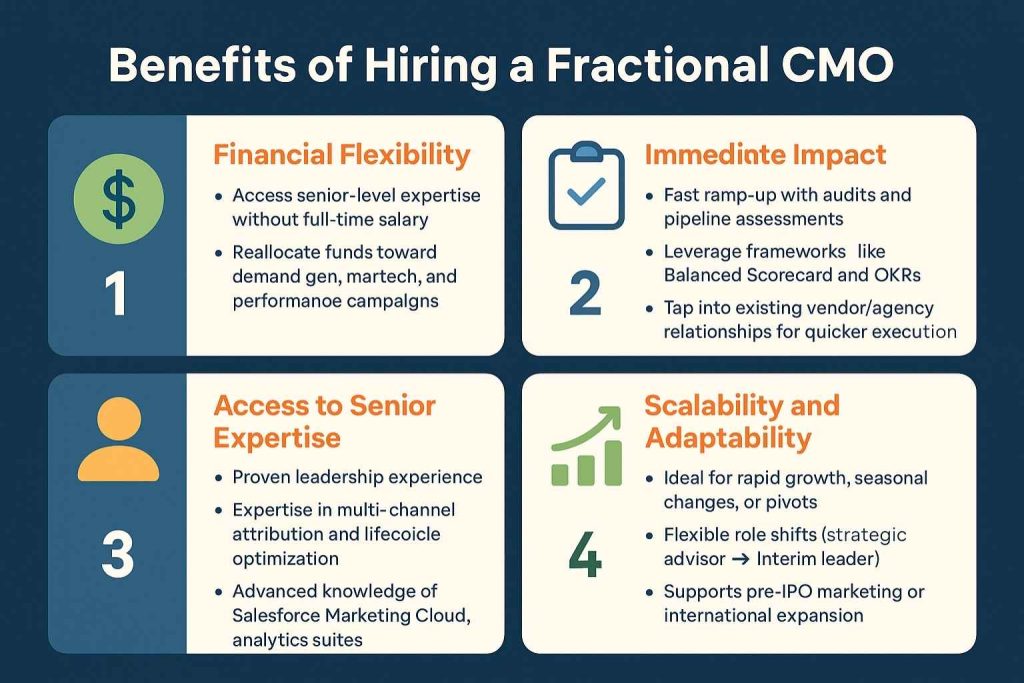
Hiring a fractional CMO delivers executive-level strategy without full-time costs, enabling rapid impact, financial flexibility, and scalable leadership. Businesses gain seasoned expertise, data-driven execution, and access to established networks, accelerating growth initiatives while optimizing resources. This adaptable model aligns with evolving needs, making it ideal for dynamic markets and capital-conscious organizations.
Industry-Specific Case Scenarios
The benefits of hiring a fractional CMO vary depending on the industry. Here are examples of how different businesses leverage fractional leadership.
- Tech Firms: There is a growing trend of SaaS startups engaging fractional CMOs to design scalable demand generation, align sales-marketing funnels, and integrate analytics. This accelerates pipeline growth without burning runway capital.
- Consumer Brands: A D2C brand hires a fractional CMO to launch TikTok, Meta, and affiliate campaigns. The result is rapid customer acquisition while maintaining brand consistency.
- Healthcare Companies: In regulated industries, fractional CMOs balance compliance with digital-first strategies, guiding PR and content marketing to build trust and credibility.
- SMBs: For small businesses, a fractional CMO establishes brand messaging, local SEO, and multi-channel campaigns, providing big-company strategy at a small-business budget.
These scenarios show why fractional marketing leadership adapts well to diverse industries.
Top 5 Benefits of Hiring a Fractional CMO for SMBs
For small and mid-sized businesses (SMBs), marketing leadership is crucial but often financially out of reach when considering a full-time CMO. This is where fractional CMOs step in, offering strategic expertise at a manageable cost. Below are the top 5 benefits of hiring a fractional CMO for SMBs:
1. Cost Efficiency Without Compromising Expertise
Hiring a full-time CMO requires a significant annual investment, excluding bonuses and benefits. For SMBs, this level of commitment is often unrealistic. A fractional CMO delivers executive-level marketing strategy and leadership at a fraction of the cost, typically through part-time engagements or retainers. This allows SMBs to compete with larger firms without breaking the bank.
2. Immediate Strategic Impact
SMBs cannot afford slow ramp-up periods. Fractional CMOs deliver results quickly, starting with marketing audits, growth strategy development, and actionable roadmaps. They focus on urgent priorities like improving lead generation and optimizing marketing spend so businesses see results in weeks rather than months.
3. Access to Specialized Expertise
SMBs often lack in-house capabilities in advanced areas such as marketing automation, CRM integration, demand generation, and data analytics. Fractional CMOs bring deep expertise across multiple industries, introducing proven frameworks and best practices that accelerate growth while avoiding common pitfalls.
4. Scalable and Flexible Engagement
Unlike full-time CMOs, fractional CMOs scale their involvement based on business needs. Start with a few hours per week for strategic planning, and expand to more intensive involvement during critical phases like funding rounds, product launches, or market expansion. This flexibility ensures SMBs always have the right level of leadership without unnecessary overhead.
5. Vendor and Agency Management
Most SMBs work with external agencies for creative, SEO, and paid media execution. Without strategic oversight, these efforts often become siloed and inefficient. A fractional CMO serves as the strategic integrator, ensuring all vendors align with overarching business goals, timelines, and KPIs, maximizing ROI and eliminating wasted spend.
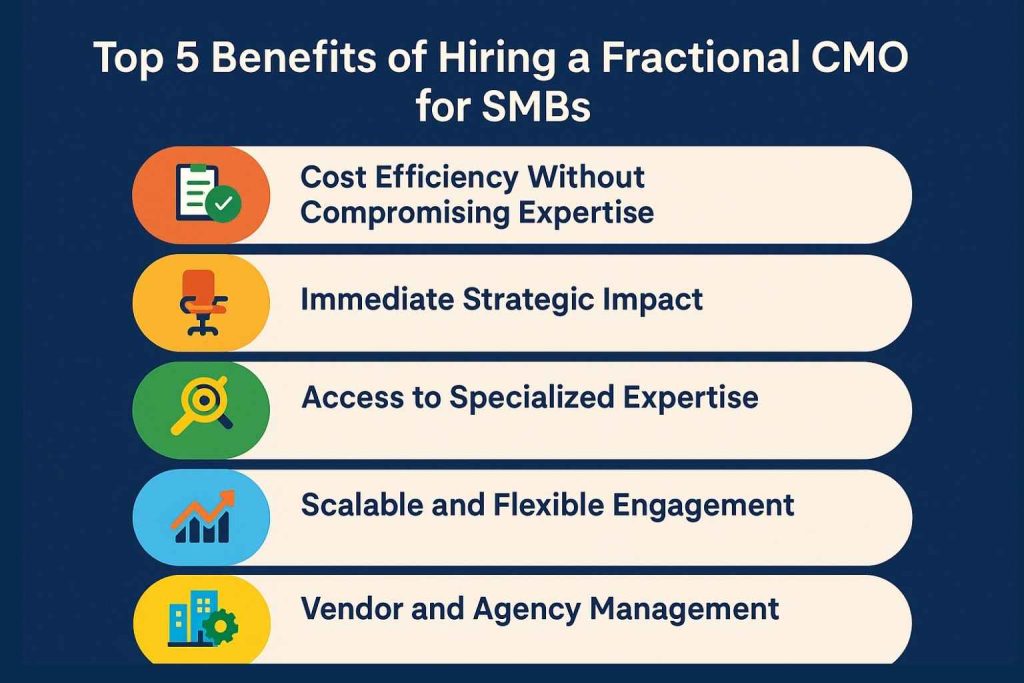
Why SMBs Should Consider a Fractional CMO
For SMBs balancing limited budgets with ambitious growth goals, a fractional CMO provides a cost-effective, scalable, and results-driven solution. They bridge the gap between vision and execution, helping businesses thrive in competitive markets without the financial burden of a full-time executive.
Fractional Marketing Execution: Beyond Strategy
Many companies mistakenly assume that fractional CMOs are purely strategic players, detached from day-to-day marketing operations. While strategy is their primary responsibility, the reality is that most fractional leaders engage deeply with execution frameworks, resource allocation, and vendor management.
Bridging Strategy and Execution
A strong marketing plan fails without disciplined execution. A fractional CMO typically:
- Standardizes workflows to reduce bottlenecks and improve outcomes
- Oversees the deployment of marketing automation systems like Marketo or Pardot to streamline campaign orchestration.
- Implements attribution models to connect campaigns with revenue performance.
The term fractional marketing execution refers to this ability to combine strategic oversight with hands-on operational leadership. For organizations transitioning from founder-led marketing or siloed departmental initiatives, this hybrid approach accelerates maturity.
Vendor and Agency Management
Another dimension of execution lies in the management of external partners. Fractional CMOs frequently collaborate with:
- Creative agencies for brand storytelling and design.
- Media buying firms for demand generation.
- SEO and content agencies for organic growth acceleration.
By serving as the strategic integrator, the fractional CMO ensures these partners align with overarching objectives, timelines, and KPIs. This model eliminates the common inefficiency of fragmented execution, where agencies operate in isolation without a unified strategy.
Data-Driven Marketing
Execution today is inseparable from analytics. Fractional CMOs prioritize the deployment of real-time dashboards through platforms like Google Looker Studio or Datorama, enabling leadership teams to monitor pipeline velocity, CAC (Customer Acquisition Cost), and ROAS (Return on Ad Spend). They use data not just for reporting but for predictive modeling, allowing companies to anticipate market shifts and adjust campaigns proactively.
When to Choose a Fractional CMO vs Full-Time CMO
Determining whether to hire a fractional or full-time CMO is not a one-size-fits-all decision. It depends on factors such as company size, growth stage, and organizational complexity.
Ideal Scenarios for Fractional CMOs
- Early-Stage Companies: Startups with lean budgets benefit from fractional leadership to set up scalable marketing systems without incurring executive-level overhead.
- Transition Periods: Organizations experiencing leadership gaps, M&A integration, or restructuring often rely on fractional CMOs as interim solutions.
- Project-Specific Needs: Businesses preparing for new product launches, geographic expansion, or demand generation scaling may engage fractional CMOs to handle high-stakes initiatives without long-term commitments.
When a Full-Time CMO Makes Sense
- Complex Global Operations: Enterprises managing multiple brands across geographies often require a full-time CMO for continuous alignment and oversight.
- In-House Execution Teams: Companies with mature marketing departments benefit from full-time leadership to maintain cohesion and culture.
- Long-Term Brand Initiatives: Sustained brand equity projects often need executives fully embedded in the organization.
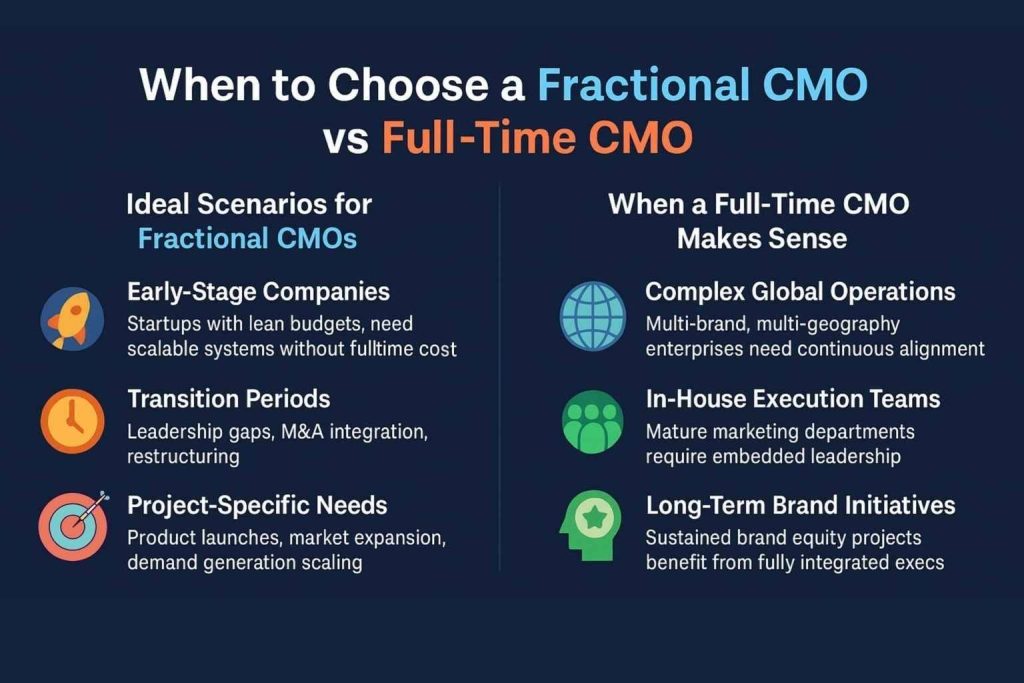
A practical decision framework involves assessing marketing spend as a percentage of revenue, internal execution capability, and growth objectives. If more than 50% of your marketing execution depends on external vendors or agencies, a fractional engagement often delivers better ROI.
The Role of Agencies in a Fractional CMO Engagement
One of the most overlooked aspects in the Fractional CMO vs. Full-Time CMO conversation is how agencies fit into the picture. The success of many organizations shows that fractional CMOs working with agencies can transform fragmented campaigns into cohesive growth engines. When you bring in a Fractional CMO, you’re not just getting strategic leadership; you’re also unlocking the potential to work more effectively with specialized agencies. This combination can be powerful, but only if there’s clear direction. Without it, businesses often end up with siloed efforts and inflated costs.
Why Agencies Matter in the Mix
Agencies are built for execution. They bring deep expertise in areas that most internal teams can’t cover without significant headcount. Think about it:
- A creative agency that’s laser-focused on building a compelling visual identity and brand story.
- A performance marketing agency that knows the ins and outs of Google Ads and Meta Ads bidding strategies.
- An analytics consultancy that can dive into multi-touch attribution and advanced reporting better than any DIY dashboard.
The challenge? Without a strategic lead to tie all these moving parts together, the result is often fragmented campaigns and wasted spend. That’s where the Fractional CMO steps in; they create the structure, set the priorities, and make sure everyone is rowing in the same direction.
How Fractional CMOs Make It Work
Fractional CMOs act like the conductor of an orchestra. Agencies are talented players, but without a score and someone to guide the tempo, the music falls apart. Here’s what that looks like in practice:
- Clear Goals and KPIs: Agencies need to know what success looks like, and the Fractional CMO defines that upfront.
- Better Coordination: Instead of agencies working in silos, the CMO ensures cross-channel alignment so efforts compound rather than conflict.
- Strategic Oversight: They translate big-picture business objectives into actionable briefs agencies can run with no guesswork involved.
When this collaboration clicks, businesses get the best of both worlds: strategic clarity at the top and flawless execution on the ground.
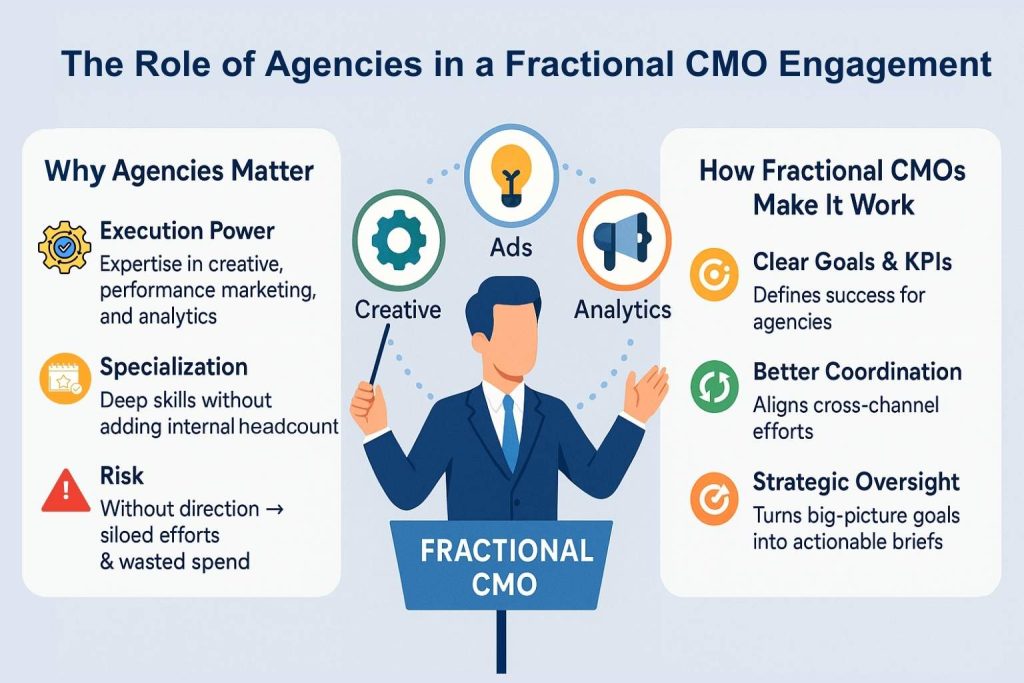
Future of Marketing Leadership
The debate around fractional CMO vs full-time CMO goes beyond a simple hiring decision. It highlights how leadership itself is evolving. Organizations are moving toward flexible, modular, and technology-driven models that prioritize agility and impact over traditional structures.
AI as a Core Driver of Marketing Leadership
Fractional CMOs are often among the earliest adopters of AI because they are expected to deliver results quickly. Instead of experimenting slowly, they integrate tools that accelerate execution:
- Content & Ideation: Jasper AI for scalable content production, ChatGPT for idea generation and personalization.
- Data & Analytics: Amplitude and Segment for predictive analytics, customer journey mapping, and growth insights.
- Campaign Optimization: AI-powered A/B testing and real-time budget allocation across digital channels.
The modern CMO, fractional or full-time, cannot ignore AI, but fractional leaders often excel because their role demands speed, adaptability, and measurable ROI.
Rise of Fractional Executives Beyond Marketing
The growth of fractional CMOs is part of a larger shift in executive hiring. Businesses are also bringing in:
- Fractional CFOs for financial strategy without long-term salary commitments.
- Fractional CTOs to lead tech innovation and digital transformation projects.
- Fractional CROs to accelerate revenue and align sales with marketing.
This trend reflects a structural change: specialized executives on demand are increasingly valued more than permanent, high-cost leadership positions.
Modular Teams and the Future Organization
The future of marketing leadership will rely on modular structures where the CMO acts as a strategic conductor rather than a full-time manager of every detail. A fractional CMO typically:
- Partners with agencies and contractors for execution.
- Provides high-level strategic oversight while maintaining accountability for outcomes.
- Scales team resources up or down depending on campaign or market needs.
This model is more adaptive and resilient than the traditional full-time-only approach.
Globalization of Fractional Marketing
Fractional CMOs are uniquely positioned to operate in a global, distributed environment. A single fractional leader might:
- Oversee a creative team in Eastern Europe,
- Manage paid media partners in Singapore, and
- Coordinate analytics teams in India.
This global orchestration provides:
- Cost efficiency without sacrificing expertise.
- Diverse perspectives that lead to more effective campaigns.
- Scalability to support regional or international expansion.
Implications for Growth Companies
For companies at different stages, the future direction is clear: fractional-first leadership models are here to stay.
- Startups: Gain immediate senior expertise without depleting capital reserves.
- SMBs: Access enterprise-level strategy without full-time costs.
- Enterprises: Use fractional CMOs to lead transformation projects or fill gaps during leadership transitions.
Businesses that embrace this model will enjoy:
- Faster execution and market responsiveness.
- Broader, cross-industry expertise.
- Reduced financial and hiring risks.
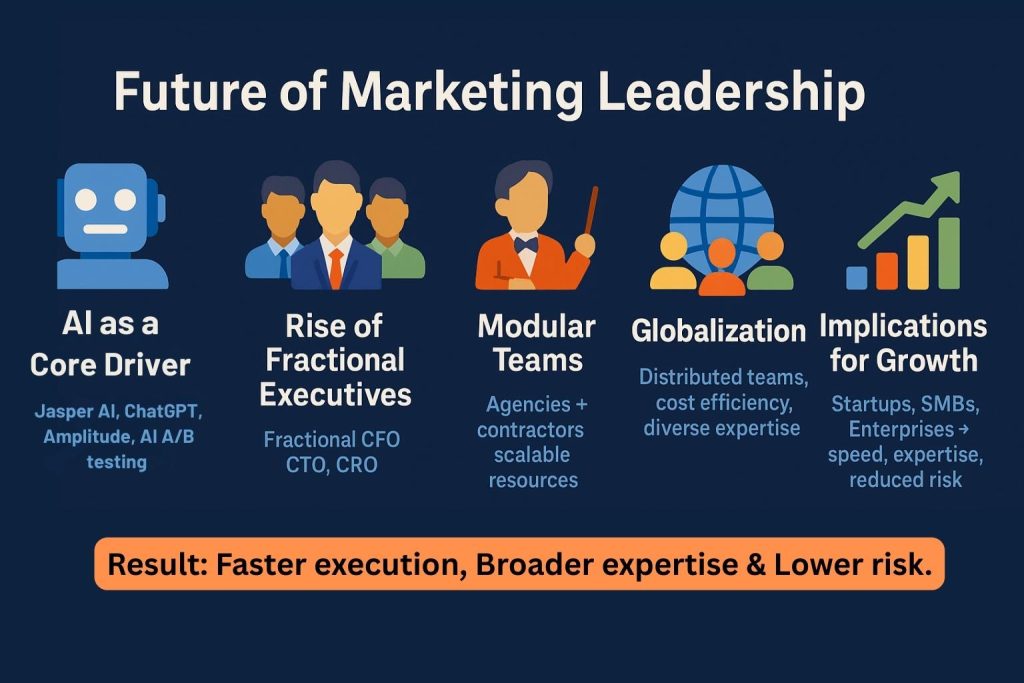
FAQs on Fractional CMO vs Full-Time CMO
1- What is a fractional chief marketing officer CMO?
A fractional CMO is a senior marketing leader who provides executive-level expertise on a part-time or project basis. They help shape strategy, oversee execution, and drive growth without the cost of a full-time executive.
2- How does a fractional CMO work?
Fractional CMOs typically engage through monthly retainers, hourly consulting, or project-based contracts. They focus on high-impact strategy and execution oversight, often collaborating with internal teams and external agencies.
3- What is the fractional CMO’s scope of work?
It includes marketing strategy development, messaging and positioning, martech stack setup, campaign planning, vendor management, and performance optimization.
4- What are the benefits of hiring a fractional CMO vs a full-time CMO?
Fractional CMOs offer flexibility, cost-efficiency, faster onboarding, and cross-industry expertise. Full-time CMOs offer continuity, deep cultural integration, and long-term brand stewardship.
5- Why hire a fractional CMO?
If your company is in growth mode, transition, or operating with limited budgets, hiring a fractional CMO provides immediate access to senior-level leadership without the overhead of a permanent executive.
Final Thoughts
The debate over Fractional CMO vs Full-Time CMO is not a matter of which is universally superior, but which aligns best with organizational context. Full-time CMOs deliver continuity, deep cultural integration, and long-term brand stewardship. However, these advantages come with high costs, slower adaptability, and hiring risks.
Fractional CMOs, by contrast, offer:
- Financial efficiency by reducing fixed costs.
- Rapid execution through compressed onboarding and actionable roadmaps.
- Strategic versatility, bringing cross-industry insights to complex marketing challenges.
- Scalability, adapting engagement terms to fit evolving business priorities.
For companies navigating high-growth phases, digital transformation, or resource constraints, the fractional model delivers measurable value. It combines the strategic depth of seasoned leadership with the agility required in dynamic markets.
If your organization is evaluating marketing leadership options, now is the time to consider whether the traditional full-time model truly serves your growth trajectory. For many businesses, the future is not about permanence but precision, accessing the right expertise, at the right time, under the right terms.
Partnering with a forward-thinking agency can amplify this advantage. Agencies like RiseOpp complement fractional CMOs by delivering executional muscle across creative, digital, and analytics functions. Together, they create a hybrid model of strategy and execution that maximizes ROI and accelerates growth.
The question is no longer whether you need a marketing leader. It is whether you need one full-time.
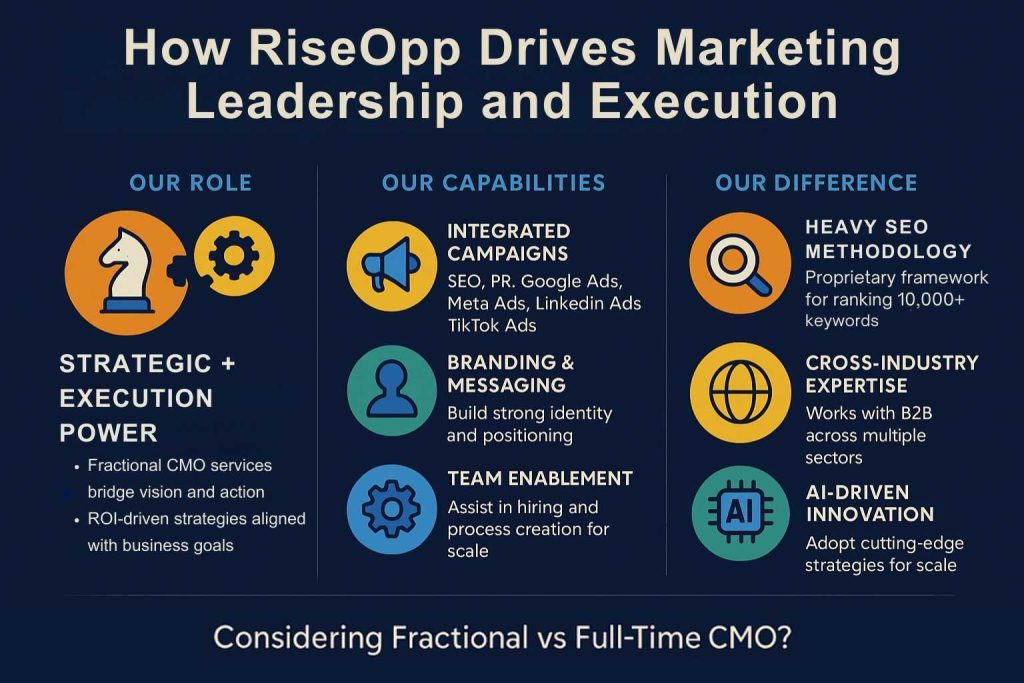
How RiseOpp Can Help You Drive Marketing Leadership and Execution
At RiseOpp, we have seen firsthand how transformative a fractional leadership model can be for businesses that need strategic expertise without the overhead of a full-time executive. Our Fractional CMO services are designed to bridge the gap between vision and execution, ensuring that your marketing strategy is not just comprehensive but also actionable and ROI-driven.
When we step in as your Fractional CMO, we don’t just provide high-level strategy. We work alongside your team to implement integrated marketing campaigns across key channels, from SEO, GEO, and PR to performance marketing on Google Ads, Meta Ads, LinkedIn Ads, TikTok Ads, and beyond. We also assist with branding, messaging, and team hiring, creating the infrastructure your organization needs to scale effectively.
What sets us apart is the combination of strategic leadership with deep executional capability. For SEO, for example, we leverage our proprietary Heavy SEO methodology, which is designed to rank websites for tens of thousands of keywords over time, providing a competitive advantage that traditional approaches cannot match. In addition to B2B and B2C clients, we partner with companies across multiple industries, helping them adopt innovative marketing strategies that thrive in the age of AI.
If you’re considering whether to hire a Fractional CMO vs Full-Time CMO, let’s explore what makes sense for your growth stage and goals. Our team would be happy to discuss how a fractional approach, backed by a proven agency partner like RiseOpp, can accelerate your marketing success.
Comments are closed